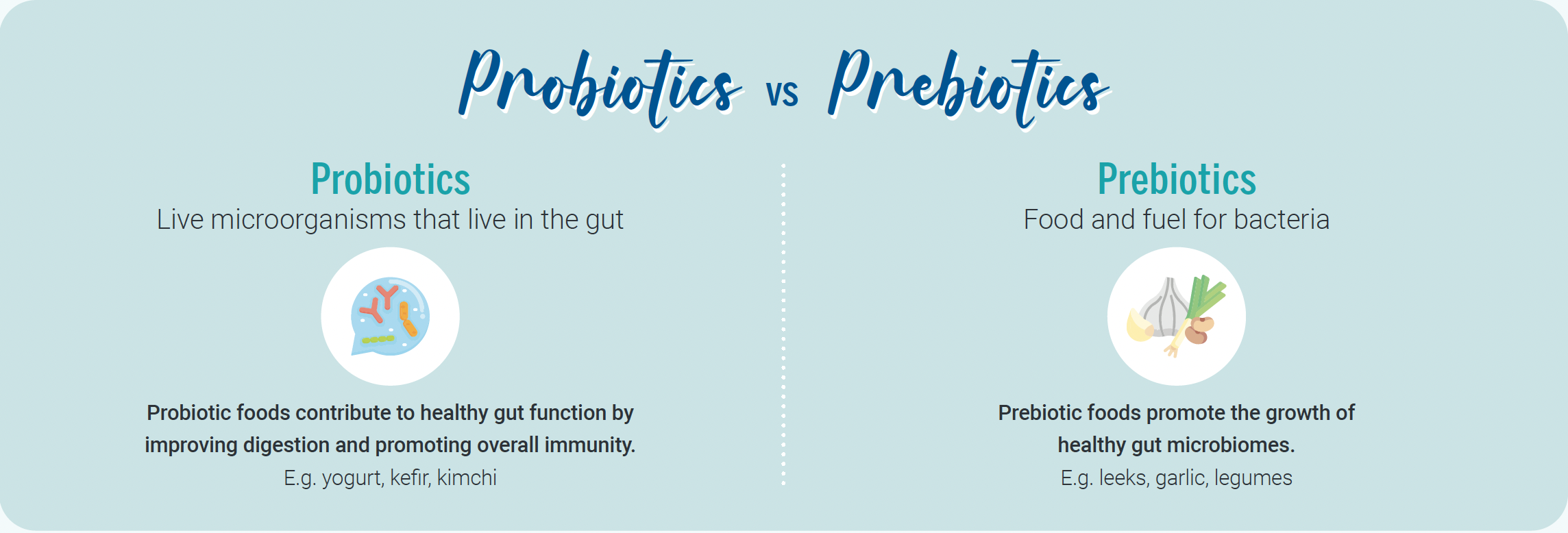News & Articles

Benefits of Probiotics for Cancer Prevention and Treatment

Probiotics have been known to support gut health and influence the body's immune response. They can also be beneficial for cancer patients. Guest doctor Dr David Ong shares more.
Probiotics are live microorganisms beneficial for the function of a healthy gut. They commonly include ‘good’ bacteria belonging to the groups Lactobacillus and Bifidobacterium, as well as yeasts such as Saccharomyces boulardii.
Probiotics allow for the optimal functioning of the gut through the production of metabolites, improving efficient digestion and promoting overall immunity.
Unlike nutritional supplements such as vitamins, minerals, herbs and amino acids, which are absorbed directly into our bloodstream, probiotics remain in the gut to encourage a healthy balance of gut bacteria 1 2.
Probiotics should not be confused with prebiotics, which are generally non-digestible carbohydrates that bacteria feed on and use as fuel. These allow probiotic bacteria in the gut to grow and thrive, and are therefore essential for a healthy gut microbiome 3.

Benefits of probiotics for cancer
Probiotics offer significant benefits for cancer prevention and cancer patients undergoing treatment:
Benefits in cancer prevention
The risk of developing cancer depends on many factors, and there is no sure way of preventing the disease or reducing one’s risk of getting the disease.
However, recent research has shown that probiotics have been found to lower the risk of colorectal, breast, cervical, liver, bladder, and colon cancers.
This is because probiotic bacteria can increase the production of anti-inflammatory cytokines, which are significant in the prevention of carcinogenesis—the process by which normal cells become cancerous 4 5 .
Furthermore, a balanced composition of bacterial populations in the gut ensures proper homeostasis—a state of balance—of the digestive system. An imbalance of the gut microbiome may result in proinflammatory immune responses, triggering disease processes such as cancer. Hence, maintaining a healthy balance of beneficial gut bacteria by taking probiotics may help reduce the risk of cancer 4.
Benefits for cancer patients undergoing treatment
As cancer treatments such as radiotherapy, chemotherapy and immunotherapy can disrupt patients’ gut microbiome, taking probiotics helps to restore a healthy balance of beneficial bacteria in the gut.
Probiotics can also reduce the frequency and severity of antibiotic-associated diarrhoea, alleviate abdominal pain and bloating caused by irritable bowel syndrome, improve immune system function, and relieve anxiety, stress, and depression 6 7.
How probiotics is leading the way in precision medicine
Improved understanding of the relationship between gut microbiota and cancer cells has led to new developments in the application of probiotics in cancer management.
Probiotics can activate phagocytes to eliminate early-stage cancer cells. Applying probiotics in therapy could be a useful adjunct, or add-on to treatments such as chemotherapy and radiation therapy.
In the case of radiation therapy, a study conducted in 1993 combining radiation and probiotic treatment on cervical cancer patients showed a stronger immune response against cancer cells, leading to enhanced tumour regression.
In immunotherapy in particular, where the patient’s immune system is harnessed to combat the cancer cells, probiotics may be helpful as it can boost patients’ immune function during treatment.
What is not widely known is that the bulk of one’s immune cells are located in the gut, which explains the intimate relationship between a healthy gut and immune function 5 8. In fact, just last year, a very interesting paper was shared at the European Society for Medical Oncology Congress, in which researchers used patients’ microbiome profiles to predict response to therapy.
This is a very exciting development as it furthers ‘precision medicine’ and the finer selection of the right medicines for a given patient and their individual condition.
Moreover, because the microbiome is modifiable, it will soon be possible to ‘optimise’ the microbiome and hence immune function before commencing immunotherapy 9.
It is important to consult your oncologist prior to taking probiotics with immunotherapy, as there are hundreds of probiotics available. A recent study revealed that the Lactobacillus strain interacts with macrophage immune cells that can set off a chain of effects resulting in tumour growth rather than tumour suppression. These findings are specific to pancreatic cancer and may explain why pancreatic cancer has not shown the same dramatic improvements we have seen in many other cancers with immunotherapy. Further studies need to be conducted to determine how exactly probiotics can affect cancer progression for different cancers and different patients 10.
Is it safe for me to take probiotics?
While the usage of probiotics does not pose cancer risks, they can increase the risk of infection in immunocompromised patients or patients with low white blood cell count if used inappropriately.
Probiotics for patients with compromised immune systems should only be used under recommendation by a dietitian or licensed healthcare professional, and only approved probiotics should be consumed 6 11 .
1 “Vitamins and Probiotics: A Comparison.” Life-Space Probiotics, https://www.lifespaceprobiotics.com/blogs/health-tips/vitamins-and-probiotics-a-comparison.
2 Gagnier, Joel J. “CHAPTER 19 - Nutritional, Herbal, and Homeopathic Supplements.” Evidence-Based Management of Low Back Pain, edited by Simon Dagenais and Scott Haldeman, Mosby, 2012, pp. 258–68. ScienceDirect, https://doi.org/10.1016/B978-0-323-07293-9.00019-2.
3 Jackson, Eric. “What Is the Difference Between Prebiotic and Probiotic Foods?” UMMS Health, 4 Mar. 2022, https://health.umms.org/2022/03/04/prebiotics-probiotics/.
4 Śliżewska, Katarzyna, et al. “The Role of Probiotics in Cancer Prevention.” Cancers, vol. 13, no. 1, Dec. 2020, p. 20. PubMed Central, https://doi.org/10.3390/cancers13010020.
5 Górska, Agata, et al. “Probiotic Bacteria: A Promising Tool in Cancer Prevention and Therapy.” Current Microbiology, vol. 76, no. 8, 2019, pp. 939–49. PubMed Central, https://doi.org/10.1007/s00284-019-01679-8.
6 “What You Should Know About Probiotics If You’re Undergoing Cancer Treatment.” Moffitt Cancer Center, https://moffitt.org/taking-care-of-your-health/taking-care-of-your-health-story-archive/what-you-should-know-about-probiotics-if-you-re-undergoing-cancer-treatment/.
7 Vivarelli, Silvia, et al. “Benefits of Using Probiotics as Adjuvants in Anticancer Therapy (Review).” World Academy of Sciences Journal, vol. 1, no. 3, May 2019, pp. 125–35. www.spandidos-publications.com, https://doi.org/10.3892/wasj.2019.13.
8 Szczyrek, Michał, et al. “Diet, Microbiome, and Cancer Immunotherapy—A Comprehensive Review.” Nutrients, vol. 13, no. 7, June 2021, p. 2217. PubMed Central, https://doi.org/10.3390/nu13072217.
9 A Predictive Score of Cancer Immunotherapy Responses Based on Ecological Analysis of Gut Microbiota | OncologyPRO. https://oncologypro.esmo.org/meeting-resources/esmo-asia-congress/a-predictive-score-of-cancer-immunotherapy-responses-based-on-ecological-analysis-of-gut-microbiota.
10 Pancreatic Cancer: Probiotic Gut Bacteria May Lead to Tumor Growth. 23 Feb. 2022, https://www.medicalnewstoday.com/articles/probiotic-gut-bacteria-may-trigger-tumor-growth-in-pancreatic-cancer.
11 “Probiotics: What You Need To Know.” NCCIH, https://www.nccih.nih.gov/health/probiotics-usefulness-and-safety.
| POSTED IN | Cancer Prevention |
| TAGS | immunotherapy, new ways to treat cancer, prevent cancer, radiotherapy (radiation therapy) |
| READ MORE ABOUT | Breast Cancer, Cervical Cancer, Colorectal Cancer, Liver Cancer |
| PUBLISHED | 01 March 2023 |
